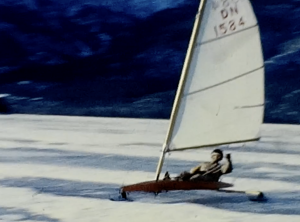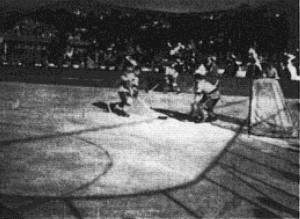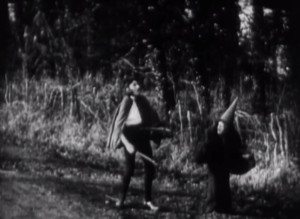
Consists of a film showing snowmobiling, ice gliding, ice fishing, downhill skiing, ski jumping, snowshoeing, skating, tobogganing, hockey, broomball and five-pin bowling.

"An excellent coverage of the sports events, of the 1960 Winter Olympics at Squaw Valley, and those in attendance. This presentation of figure and speed skating, ice hockey games, trail skiing and skii jumping with a good view of the spills, and sundry outdoor activities, will be a pleasure to those who enjoy the sports. Truly a fine presentation of the subject" PSA Journal, Oct. 1961, 48.
"Film features people walking in the winter, with the camera focussing mostly on their legs and feet" Archives of Ontario.
"Film recording details of winter sports in Switzerland, including horse racing and skiing." (EAFA Database)
"Wire and Cable Manufacture, made by Robert F. Gowen, ACL, is a good example of what can be done with the presentation of heavy manufacturing processes. The many fine shots of large machines in motion as well as of rolling hot copper ingots were striking in their beauty. A careful record of the entire process of making a giant cable was worked out on short notice and was photographed in a short time. Many difficult lighting problems were overcome, and the result is an achievement that will do credit to the manufacturer's reputation and will add prestige to Mr. Gowen's cine fame." Movie Makers, Dec. 1935, 553, 555.
"is mostly interior, and was shot in the private house of the society’s cameraman, Dr. R.H. Reece" (Lovell Burgess 1931: 8).

"A witch who tires of her venomous role decides to transmit her characteristics to the soul of a cat. In this utterly charming film, William A. Thomas shows that he understands this soul perfectly — in both its winsome and its wilder aspects. With inexhaustible patience, he has recorded all the mischievous doings of a lively kitten that finally sees the light of love and casts off the witch's spell — i.e., the cat has kittens. Mr. Thomas's staging of the witch scenes — a role played with relish by Olive Thomas — is eerie and effective, while his sequences on the satanic feline are done with amused affection. The Witch Cat will appall those who "can't bear the beasts," delight those who adore them." Movie Makers, Dec. 1949, 455.

"Possibly the first student film ever made, this tale of a magical instrument was shot by the newly formed Cambridge University Kinema Club. While the film is a daft comedy, its creators went on to careers straight from a thriller: director Peter Le Neve Foster spent years filming behind the Iron Curtain, his assistant director Cedric Belfrage was a suspected Russian spy, and Pembroke Stephens - the lovesick youth - was killed in 1937 while reporting on the Japanese invasion of China." (BFI Player)
Total Pages: 299